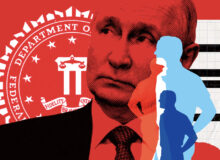Last week, as you may have heard, parts of the country endured hot weather. That happens in late July. This week, temperatures across America are back near seasonal averages, as they were through June and much of July. But that can’t stop cataclysmic rhetoric and outright lies from partisan media.
c
‘Heat health emergency’: Nearly half the U.S. at risk, as dangerous heat intensifies,” CBS shouted last week in an oddly worded headline.
c
If heat waves are as deadly as CBS and flawed data believe, how did humans survive for millennia without air conditioning? The secular left fails to acknowledge that humans show a stunning ability to adapt, even as a cult bemoans summer weather and predictably blames Republicans — as if Republicans control the weather!
c
A Bloomberg piece warns, “Extreme Temperatures Are Hurting Our Mental Health.” Apparently, every social problem is now attributable to climate change, when in reality, hyperbolic stories about lousy weather lead to mental derangement, especially among impressionable young people, not the weather.
c
The Bloomberg reporter cited an analysis that found a flimsy link between higher temperatures and mental illness. But the study deems the evidence “low certainty” due to inconsistent methodologies, measured variables, and definitions. The author admitted, “Climate change might not necessarily increase mental health issues because people might adapt over time, meaning that higher temperatures could become normal and not be experienced as anomalous or extreme.”
c
That’s gutter journalism. Also, cold weather is more dangerous than warm, but we don’t read that in the doldrums of January.
c
Further, before the doomsday media began hysterically ranting about high temperatures — with little scientific or factual evidence — heat waves were deemed a regular part of summer. EPA data shows it was significantly warmer in the 1930s than now.
c
However, they persist. According to a World Health Organization report last year, the “awareness of climate change and extreme weather events and their impacts” may lead to strained social relationships, depression, spousal abuse, suicidal behavior, and alcohol and substance abuse.
c
This is also child abuse, considering a study of 16- to 25-year-olds in 10 countries, including the U.S., reported that 60% were extremely worried about climate change and nearly 85% were somewhat worried. Nearly half claimed they were so worried that they couldn’t function daily.
c
“Adults must understand that youth climate anxiety is an emotionally and cognitively functional response to real existential threats,” a deluded writer argued in the journal Nature. “Although feelings of powerlessness, grief, and fear can be profoundly disruptive…it is important to acknowledge that this response is rational.”
d
No. These anxieties are not rational nor based on science. A better term for this unwarranted fear is climate hypochondria.
e
Earlier this month, New Yorker Magazine published a bombastic 4,400-word piece titled “What to Do With Climate Emotions” by a neurotic progressive called Jia Tolentino. She opined, “It may be impossible to seriously consider the reality of climate change for more than ninety seconds without feeling depressed, angry, guilty, grief-stricken, or simply insane. A couple of years ago, reading a climate report on my phone in the early morning hours, I went into a standard-issue emotional spiral thinking about it all.”
c
Some lefties now even use climate change as a reason not to procreate. A “mental-health reporter” for Vox recently wrote that “some people grapple with the existential question of whether to have children because of the human toll on the planet’s resources.”
c
The weather is typical, yet climate anxiety is not normal; climate hypochondriacs clearly suffer from mental illness. We can have empathy but don’t enable their neuroses and hurt the country over anti-science claptrap.
c
i
Ari J. Kaufman is a correspondent for several U.S. newspapers and magazines, from Minnesota and Ohio to Tennessee and Virginia. He taught public school and served as a military historian before beginning his journalism career in 2011. He is the author of three books, a semi-frequent guest on radio programs, and a contributor to Arutz Sheva and here at The Lid.
h






